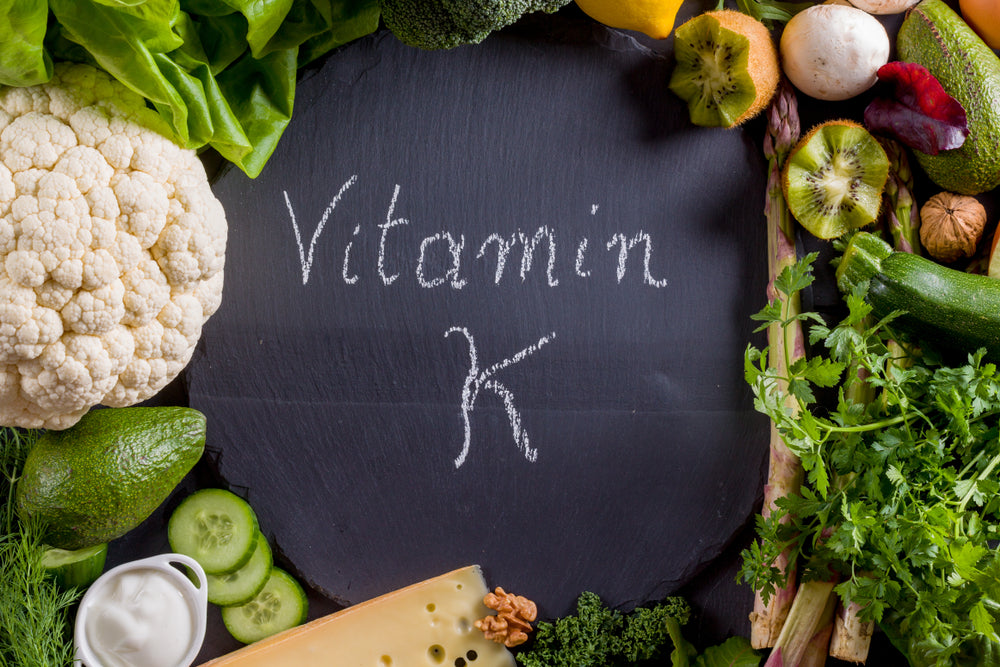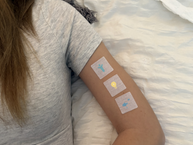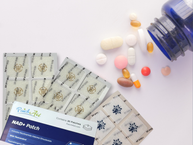Vitamin K is just as important as other vitamins, even though it may not always get as much attention. It is necessary for bone health, proper blood clotting, and more. If you are not getting enough from the foods you eat, or you are having trouble absorbing it, a supplement, such as the Vitamin D3 with K2 Patch by PatchAid, can provide additional amounts of vitamin K.* Be sure to talk to your healthcare provider before taking any nutritional supplement.
Meet Vitamin K
Vitamin K is a fat-soluble vitamin. It was named vitamin “K” because of its first-known role as a blood coagulation factor. The Danish word for “coagulation” is “koagulation.”
Vitamin K comes in two forms.
- Vitamin K1 is called phylloquinone. It is in foods such as leafy green vegetables.
- Vitamin K2 is called menaquinone. It is produced by bacteria in your gut.
Unlike other fat soluble vitamins, such as vitamins A, D, and E, vitamin K is not stored in high amounts in your body. However, healthy adults can recycle vitamin K to reduce your need to take it in every day.
The form of vitamin K in the Vitamin D3 with K2 Patch by PatchAid is menaquinone.
Four Functions of Vitamin K
The main role of vitamin K in the body is as a cofactor for reactions. That means it helps your body move forward with normal processes. These are some main ones.*
- Blood coagulation. When you cut or bruise yourself, your blood goes through a series of steps to coagulate, or clump together, so the bleeding can stop. Vitamin K allows for the production of thrombin, which allows your blood to coagulate normally so bleeding is not excessive.
- Bone health. Vitamin K is necessary to prevent your bones from becoming soft. Vitamin K allows for normal bone mineralization, including with calcium, phosphorus, and potassium.
- Heart health. On the other hand, vitamin K is necessary for preventing abnormal calcification, or hardening, of the arteries and other blood vessels.
- Antioxidant. Vitamin K may have antioxidant properties, which can protect cells against damage from compounds called free radicals.
Both phylloquinone and menaquinone have specific roles in the body.
Ways to Get Enough Vitamin K
Most adults need about 90 to 120 micrograms of vitamin K daily. You can get phylloquinone from foods such as green vegetables, including watercress, spinach, kale, and broccoli. Natto, or fermented soybeans, is a source of menaquinone.
Deficiency is more likely if you have any of these conditions.
- Bariatric surgery
- Fat malabsorption disorder
- Certain medications
- Liver or kidney disease
The Vitamin D3 with K2 Patch by PatchAid has 290 micrograms of vitamin K. It also has vitamin D and calcium. The Vitamin D3 with K2 Patch by PatchAid may:*
- Support heart, bone, and blood vessel health.
- Promote normal blood health.
- Support normal immune function.
Just apply one patch daily, and there is no need to worry about taking oral supplements and having possible gastrointestinal side effects, such as an upset stomach.
The Vitamin D3 with K2 Patch by PatchAid is an easy way to get more vitamin K without worrying about eating your broccoli or getting it absorbed in the digestive tract.* Ask your healthcare provider if this may be a good option for you to support bone, heart, and metabolic health.*
*The Food and Drug Administration has not evaluated these statements. PatchAid patches are not intended to diagnose, treat, cure or prevent any disease. Anyone with a medical condition should seek the advice of a licensed medical practitioner. Individual results may vary.







